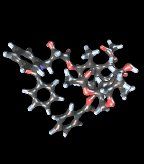ASCO: Paclitaxel Proves Better Than Newer Chemotherapies in Metastatic Breast Cancer
The results of a randomized phase III trial show paclitaxel beat two newer chemotherapies, nab-paclitaxel and ixabepilone in the treatment of metastatic breast cancer patients who have not had prior systemic therapies.
The results of a randomized phase III trial show paclitaxel beat two newer chemotherapies-nab-paclitaxel (Abraxane) and ixabepilone (Ixempra)-in the treatment of metastatic breast cancer patients who have not had prior systemic therapies. Paclitaxel fared better in terms of both efficacy and safety compared to the newer agents at the designated doses.

Chemical structure of paclitaxel
Ixabepilone was found to be significantly inferior to the standard paclitaxel regimen in the first interim analysis, with subsequent closure of the ixabepilone arm. Nab-paclitaxel was found to be nonsuperior to paclitaxel. Median progression-free survival was 10.4 months for paclitaxel, 9.6 months for nab-paclitaxel, and 7.6 months for ixabepilone at the 12-month follow up.
These results were reported at the annual meeting of the American Society of Clinical Oncology by the lead author of the study, Hope S. Rugo, MD, professor of medicine and the director of breast oncology at the Helen Diller Family Comprehensive Cancer Center at the University of California in San Francisco.[1]
Dr. Rugo reported that based on these data, it is highly unlikely that either of the newer chemotherapies will be shown to be superior to paclitaxel for progression-free survival in combination with bevacizumab, which was given to all patients on the trial. Importantly, paclitaxel was also better tolerated compared to either ixabepilone or nab-paclitaxel.
The trial equally randomized 799 patients to one of three chemotherapy regimens, administered weekly: 283 patients received paclitaxel (90 mg/m2), 271 patients were given nab-paclitaxel (150 mg/m2), and 245 patients were giben ixabepilone (16 mg/m2). Chemotherapy was given weekly for 3 weeks followed by 1 week off for a total of six 4-week cycles.
Patients in each arm also received 10 mg/kg bevacizumab every 2 weeks. According to Rugo, 98% of patients on the trial received bevacizumab. Seventy-two percent of the patients on the trial had estrogen-receptor–positive disease and 44% had received prior adjuvant therapy.
The cooperative trial was sponsored by both the North Central Cancer Treatment Group and the Cancer and Leukemia Group B, both of which receive funding from the National Cancer Institute.
Reported high-grade hematological toxicity was 51% for nab-paclitaxel (P < .0001 vs paclitaxel), 12% for ixabepilone (P = .004 vs paclitaxel), and 21% for paclitaxel. The trial analyzed peripheral neuropathy in all patients. Rugo pointed out that incidence of peripheral neuropathy was higher the two experimental arms compared to the paclitaxel control arm. “We are continuing to follow the impact of peripheral neuropathy on patient assessment and life as part of our substudies in this trial,” Rugo stated in a press conference.
High-grade nonhematological malignancies occurred in 56% of patients treated with ixabepilone (P = .005), 60% of patients in the nab-paclitaxel arm (P = .0002), and 44% of patients in the control paclitaxel arm.
Celgene, the company that makes nab-paclitaxel pointed out in a statement that the 150 mg/m2 weekly dose used in this trial that was associated with higher toxicity levels is actually not the approved dose for the chemotherapy. Celgene believes that this study doesn’t impact the breast cancer data on nab-paclitaxel showing efficacy and an overall survival benefit in a randomized, head-to-head trial.
“What we learned [from this clinical trial] is that paclitaxel at the standard dose we are using is a good drug and it’s as good or better than the two comparators, at least at these doses and given weekly,” Rugo said. Clinicians are likely to take these trial results into consideration, particularly in the context of cost as paclitaxel was found superior to two more expensive chemotherapy agents and showed lower toxicity levels.
Reference
1. Rugo HS, Barry WT, Moreno-Aspitia A, et al. CALGB 40502/NCCTG N063H: Randomized phase III trial of weekly paclitaxel (P) compared to weekly nanoparticle albumin bound nab-paclitaxel (NP) or ixabepilone (Ix) with or without bevacizumab (B) as first-line therapy for locally recurrent or metastatic breast cancer (MBC). J Clin Oncol. 2012;30:(suppl; abstr CRA1002).